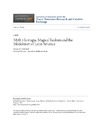Please use this identifier to cite or link to this item:
https://accedacris.ulpgc.es/jspui/handle/10553/44269
| DC Field | Value | Language |
|---|---|---|
| dc.contributor.author | Llarena, Alicia | en_US |
| dc.date.accessioned | 2018-11-21T21:34:09Z | - |
| dc.date.available | 2018-11-21T21:34:09Z | - |
| dc.date.issued | 2003 | en_US |
| dc.identifier.issn | 0319-051X | en_US |
| dc.identifier.uri | https://accedacris.ulpgc.es/handle/10553/44269 | - |
| dc.description.abstract | The similarities between Latin American magical realism and European surrealism have long been regarded as part of a shared, cohesive movement in literature and art. After all, they share certain nonsensical and fantastical traits that place both movements far away from the Realism that modernism, as a whole, refutes. But in light of postcolonial theory, it becomes more and more necessary to explore magical realism as a geographically and politicallysituated movement with its own unique value in discussions of Modernism; not an offshoot of surrealism, but a sister genre, born in the distinct atmosphere of a region trying to self-identify in the face of postcolonial modernization. By exploring the conventions of the genre through some of its foundational texts—A Universal History of Infamy, The Kingdom of this World, and particularly, Men of Maize—we can then reinsert magical realism into a larger discussion about modernism in order to enrich and complicate what its global iterations meanoutside of Europe. After a quick historical background regarding the origins of magical realism, first as a regional genre and then as a field of academic study, the thesis will engage with a close reading of some ofthe mythological elements of Miguel Angel Asturias’ Men of Maize. The novel will be read in light of mythmaking, postcolonial theory, and theory regarding both genre and novel conventions. The claim in the end is that Men of Maizeshowcases a Latin American encounter with modernism and modernity that results in a fractured identity, which Asturias ultimately attempts to heal through myth and magical realism. | en_US |
| dc.language | eng | en_US |
| dc.publisher | 0319-051X | - |
| dc.relation.ispartof | Canadian Review of Comparative Literature | en_US |
| dc.source | Canadian Review of Comparative Literature[ISSN 0319-051X],v. 30, p. 313-333 | en_US |
| dc.subject | 57 Lingüística | en_US |
| dc.subject | 570107 Lengua y literatura | en_US |
| dc.title | Magical realism once again: From myth to post-modernity | en_US |
| dc.type | info:eu-repo/semantics/review | es |
| dc.type | Article | es |
| dc.identifier.scopus | 60950688526 | - |
| dc.contributor.authorscopusid | 26035270500 | - |
| dc.description.lastpage | 333 | - |
| dc.description.firstpage | 313 | - |
| dc.relation.volume | 30 | - |
| dc.investigacion | Artes y Humanidades | en_US |
| dc.type2 | Reseña | en_US |
| dc.date.coverdate | Junio 2003 | |
| dc.identifier.ulpgc | Sí | es |
| dc.description.esci | ESCI | |
| dc.description.erihplus | ERIH PLUS | |
| item.fulltext | Con texto completo | - |
| item.grantfulltext | open | - |
| crisitem.author.dept | GIR Pensamiento, Creación y Representación en el ámbito de los Estudios Culturales | - |
| crisitem.author.dept | Departamento de Filología Hispánica, Clásica y de Estudios Árabes y Orientales | - |
| crisitem.author.orcid | 0000-0003-2475-4141 | - |
| crisitem.author.parentorg | Departamento de Filología Hispánica, Clásica y de Estudios Árabes y Orientales | - |
| crisitem.author.fullName | Llarena González, Alicia | - |
| Appears in Collections: | Reseña | |
SCOPUSTM
Citations
1
checked on Jun 8, 2025
Page view(s)
202
checked on Jul 12, 2025
Download(s)
607
checked on Jul 12, 2025
Google ScholarTM
Check
Share
Export metadata
Items in accedaCRIS are protected by copyright, with all rights reserved, unless otherwise indicated.
